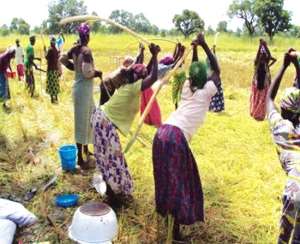
Every year, the United Nations World Food Programme (WFP) provides more than eleven million school girls with food to help keep them in education and around three million vulnerable women with special nutritional support.
According to WFP Executive Director Ertharin Cousin, “Giving women the power to make choices over their lives is one of the first steps towards a world with zero hunger.”
In a statement to mark this year's, International Women's Day which fell on March 8, the WFP said: “In every country where WFP works, women are front and centre in programmes to tackle the problems of food insecurity and undernutrition. We work with women farmers, traders, nutrition workers, school cooks and we serve millions of schoolgirls, pregnant women and nursing mothers.”
WFP programme
It said one example of a WFP programme that focused on women's advancement was Purchase for Progress (P4P), an initiative that helped smallholder farmers, particularly women, to become competitive players in the marketplace by producing food for sale and consumption in WFP programmes.
In Ghana, almost half of the 1,500 smallholder farmers participating in the P4P initiative are women. In northern Ghana, where women traditionally reap, thresh and process rice for sale using tedious manual methods of parboiling, P4P has provided farmer groups with rice threshers and reapers, as well as semi-mechanised parboilers to ease the physical burden of their work.
By using the tools provided by WFP, smallholder women farmers such as Afeshetu Sumani, who lives in the village of Kpalsi in Tamale in the Northern Region, have drastically reduced the amount of time they spend parboiling rice, from three hours to 30 minutes. No longer exposed to the intense heat and stinging smoke she had to endure using traditional methods, Afeshetu feels empowered to produce more.
Support from other partners
With support from other partners, including UN Women, Women in Agricultural Development of the Ministry of Food and Agriculture and FAO, WFP have developed a P4P Gender Action Plan to address the specific challenges women faced. WFP is targeting to train over 700 women this year.
“WFP has strong partners who provide women farmers with training in areas that they have identified themselves to improve their ability to compete in the marketplace, including food fortification, literacy and time management,” said Pippa Bradford, WFP Representative and Country Director.




 NDC demands complete overhaul of security protocols at EC to safeguard electoral...
NDC demands complete overhaul of security protocols at EC to safeguard electoral...
 Ghana reaches interim deal with international bondholders — Finance Ministry
Ghana reaches interim deal with international bondholders — Finance Ministry
 Mahama to form joint army-police anti-robbery squads to safeguard 24-hour econom...
Mahama to form joint army-police anti-robbery squads to safeguard 24-hour econom...
 Another man jailed eight months over shrinking penis
Another man jailed eight months over shrinking penis
 Ghana to adjust external bond deal to meet IMF debt sustainability goals — Finan...
Ghana to adjust external bond deal to meet IMF debt sustainability goals — Finan...
 IMF negotiations: We've not failed to reach an agreement with bondholders; we’ve...
IMF negotiations: We've not failed to reach an agreement with bondholders; we’ve...
 EC begins recruitment of temporary electoral officials, closes on April 29
EC begins recruitment of temporary electoral officials, closes on April 29
 NPP lost the 2024 elections in 2022 due to inflation and cedi depreciation — Mar...
NPP lost the 2024 elections in 2022 due to inflation and cedi depreciation — Mar...
 Your good heart towards Ghana has changed; don’t behave like Saul - Owusu Bempah...
Your good heart towards Ghana has changed; don’t behave like Saul - Owusu Bempah...
 Wa West: NDC organizes symposium for Vieri Ward Women
Wa West: NDC organizes symposium for Vieri Ward Women
